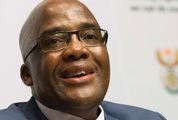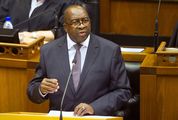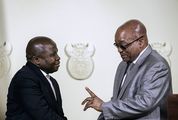JAZZ: Festival line-up a fine harmony
by Gwen Ansell,
2015-12-04 05:00:00.0
THE Cape Town International Jazz Festival usually announces half its artists in December and half in January. In a break with tradition, fans already have the full line-up for the events of next April 1 and 2.
The programme for a mega-festival always demands a balancing act: commercial sounds against niched music; nostalgia against edge. Many fans felt this year’s bill tipped too far towards the former. While it did not diminish audiences, it did affect the texture of the event.
Yet it is possible both to pay homage to the South African heritage and keep jazz front and centre. The 2016 line-up has moved much closer to that ideal. The heritage names include original composers, breathtaking performers and powerful improvisers.
Pianist Tete Mbambisa will present an updated edition of his Big Sound ensemble. Mbambisa was one of the shapers of the South African modern jazz sound of the 1970s through albums such as Tete’s Big Sound, Did You Tell Your Mother and Inhlupeko with the Soul Jazzmen. (That last has just been rereleased, and Mbambisa also has a current solo outing, Black Heroes). His concerts in London earlier this year had critics comparing his fine sense of space to that of Bill Evans.
Themba Mokoena also shaped musical history. The guitarist worked in Gibson Kente’s theatre ensembles; the house band of Johannesburg’s first jazz club, The Pelican; and with The Peddlers, who backed soul singer Mpharanyana. More recently, he has worked with Sibongile Khumalo, Phinda Mtya and as a solo performer at various venues.
He’s a guitarist’s guitarist, named in admiring tones by players such as Jimmy Dludlu and Selaelo Selota, with roots in both indigenous tradition and the style of classic players such as Wes Montgomery.
The third of these historic acts is reedman Lemmy "Special" Mabaso, probably the best-known of the penny-whistling kwela kids of the 1950s and later an accomplished saxophonist. He will feature with veteran masters of song, Dorothy Masuka and Abigail Kubeka.
The younger generation of South African acts at the festival demonstrate how our jazz is still growing and being reshaped: pianists Bokani Dyer, Thandi Ntuli, Ramon Alexander and Nduduzo Makhathini (working with British flautist Eddie Parker); guitarists Cameron Ward and Derek Gripper; bassist Benjamin Jephta; and drummer Tumi Mogorosi with Project ELO.
Such a strong assembly alone makes the festival worth attending. Although these artists play regularly, it would be hard to find them all in one location.
However, jazz festivals need also to be a space for cross-fertilisation between home and abroad — on stages and through networking and jam sessions. The visitors are an equally interesting selection.
Saxophonist Mark Turner won critical acclaim for his 2014 quartet album, Lathe of Heaven, but that was the culmination of a slow-burning career that started in the mid-1990s.
While he did not release his debut album until he was 29, and rarely drew as much attention as some others in his generation, at 50 he is now hailed as one of the US’s most influential players.
His style carries echoes of Warne Marsh and John Coltrane, but filtered through an intense thoughtfulness expressed in winding, beautifully patterned lines.
Other visiting instrumentalists include multi-genre drummer Sheila E, bassist Victor Wooten, saxophonist Rick Braun and Canadian trio BadBadNotGood.
Singer Cassandra Wilson returns to the festival with her revisioning of the music of Billie Holiday, Coming Forth by Day, which juxtaposes mastery of the intimate narrative with a challenging tapestry of contemporary sounds. Wilson is a singer who can do all the expected things — hit the notes, utter sweet and earthy sounds, make shapes around a melodic line — but never does them in a predictable way.
Coming Forth by Day abandons all easy preconceptions about how these classic songs should sound, and who Holiday was.
Among the other visitors are Meshell Ndegeocello, Angie Stone, Lizz Wright and SWV — all crowd-pleasers, but close enough to jazz roots to please the afficionados.
Finally, if Gripper’s reimagining of kora music on guitar leaves you hungry for more Mali, the festival offers a chance to savour the singing of Amadou and Mariam.
BBC World Music, French Victoire de Musique and Songlines award-winners and Grammy nominees, the pair combine the blues-inflected feel of Malian tradition with a willingness to experiment across modern music.
-
Tete Mbambisa, one of the country’s jazz pioneers, will present an updated version of his Big Sound ensemble. Picture: SUPPLIED
-
Cameron Ward joins a host of other young musicians who demonstrate that jazz is still growing in SA. Pictures: SUPPLIED
THE Cape Town International Jazz Festival usually announces half its artists in December and half in January. In a break with tradition, fans already have the full line-up for the events of next April 1 and 2.
The programme for a mega-festival always demands a balancing act: commercial sounds against niched music; nostalgia against edge. Many fans felt this year’s bill tipped too far towards the former. While it did not diminish audiences, it did affect the texture of the event.
Yet it is possible both to pay homage to the South African heritage and keep jazz front and centre. The 2016 line-up has moved much closer to that ideal. The heritage names include original composers, breathtaking performers and powerful improvisers.
Pianist Tete Mbambisa will present an updated edition of his Big Sound ensemble. Mbambisa was one of the shapers of the South African modern jazz sound of the 1970s through albums such as Tete’s Big Sound, Did You Tell Your Mother and Inhlupeko with the Soul Jazzmen. (That last has just been rereleased, and Mbambisa also has a current solo outing, Black Heroes). His concerts in London earlier this year had critics comparing his fine sense of space to that of Bill Evans.
Themba Mokoena also shaped musical history. The guitarist worked in Gibson Kente’s theatre ensembles; the house band of Johannesburg’s first jazz club, The Pelican; and with The Peddlers, who backed soul singer Mpharanyana. More recently, he has worked with Sibongile Khumalo, Phinda Mtya and as a solo performer at various venues.
He’s a guitarist’s guitarist, named in admiring tones by players such as Jimmy Dludlu and Selaelo Selota, with roots in both indigenous tradition and the style of classic players such as Wes Montgomery.
The third of these historic acts is reedman Lemmy "Special" Mabaso, probably the best-known of the penny-whistling kwela kids of the 1950s and later an accomplished saxophonist. He will feature with veteran masters of song, Dorothy Masuka and Abigail Kubeka.
The younger generation of South African acts at the festival demonstrate how our jazz is still growing and being reshaped: pianists Bokani Dyer, Thandi Ntuli, Ramon Alexander and Nduduzo Makhathini (working with British flautist Eddie Parker); guitarists Cameron Ward and Derek Gripper; bassist Benjamin Jephta; and drummer Tumi Mogorosi with Project ELO.
Such a strong assembly alone makes the festival worth attending. Although these artists play regularly, it would be hard to find them all in one location.
However, jazz festivals need also to be a space for cross-fertilisation between home and abroad — on stages and through networking and jam sessions. The visitors are an equally interesting selection.
Saxophonist Mark Turner won critical acclaim for his 2014 quartet album, Lathe of Heaven, but that was the culmination of a slow-burning career that started in the mid-1990s.
While he did not release his debut album until he was 29, and rarely drew as much attention as some others in his generation, at 50 he is now hailed as one of the US’s most influential players.
His style carries echoes of Warne Marsh and John Coltrane, but filtered through an intense thoughtfulness expressed in winding, beautifully patterned lines.
Other visiting instrumentalists include multi-genre drummer Sheila E, bassist Victor Wooten, saxophonist Rick Braun and Canadian trio BadBadNotGood.
Singer Cassandra Wilson returns to the festival with her revisioning of the music of Billie Holiday, Coming Forth by Day, which juxtaposes mastery of the intimate narrative with a challenging tapestry of contemporary sounds. Wilson is a singer who can do all the expected things — hit the notes, utter sweet and earthy sounds, make shapes around a melodic line — but never does them in a predictable way.
Coming Forth by Day abandons all easy preconceptions about how these classic songs should sound, and who Holiday was.
Among the other visitors are Meshell Ndegeocello, Angie Stone, Lizz Wright and SWV — all crowd-pleasers, but close enough to jazz roots to please the afficionados.
Finally, if Gripper’s reimagining of kora music on guitar leaves you hungry for more Mali, the festival offers a chance to savour the singing of Amadou and Mariam.
BBC World Music, French Victoire de Musique and Songlines award-winners and Grammy nominees, the pair combine the blues-inflected feel of Malian tradition with a willingness to experiment across modern music.



















Change: -1.87%
Change: -1.56%
Change: -5.10%
Change: -0.75%
Change: -0.06%
Data supplied by Profile Data
Change: 0.00%
Change: 0.00%
Change: -1.87%
Change: 0.00%
Change: 0.00%
Data supplied by Profile Data
Change: 0.07%
Change: -0.05%
Change: -0.01%
Change: 3.31%
Change: 0.11%
Data supplied by Profile Data
Change: 0.00%
Change: 0.00%
Change: 0.00%
Change: 0.00%
Change: 0.00%
Data supplied by Profile Data